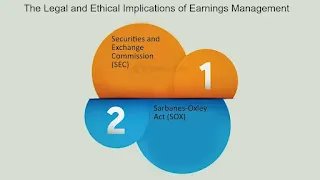Great follow-up topic! “Analysis of Ethics and Legal Consequences of Earnings Management Practices” dives into the moral and regulatory dimensions of a widely debated corporate strategy. Here's a suggested framework and key content ideas to guide your analysis:
1. Introduction
- Define earnings management (EM).
- Differentiate between legal (within GAAP/IFRS) vs. illegal (fraudulent) EM.
- State your objective: to evaluate both ethical concerns and legal ramifications associated with EM.
2. The Ethical Perspective
2.1. Ethical Theories Applied
- Utilitarianism: Is EM justified if it benefits shareholders in the short term?
- Deontology: Does EM violate moral duty, even if technically legal?
- Virtue Ethics: Is EM consistent with corporate integrity?
2.2. Stakeholder Impact
- Investors: Misled financial data may distort investment decisions.
- Employees: May suffer from layoffs due to poor long-term consequences.
- Public Trust: EM erodes confidence in financial markets.
3. Legal Considerations
3.1. Laws and Regulations
- SEC regulations (e.g., Regulation G in the U.S.).
- Sarbanes-Oxley Act: Strengthened penalties for fraudulent EM.
- IFRS/GAAP frameworks: Provide room for judgment but set limits.
3.2. Legal vs. Illegal EM
- Legal: Use of accounting flexibility within the rules.
- Illegal: Intentional misrepresentation or fraud (e.g., falsifying revenue).
3.3. Case Studies of Legal Consequences
- Enron: Use of SPEs to hide debt.
- WorldCom: Capitalized expenses to inflate earnings.
- Toshiba: Overstated profits by nearly $1.2 billion.
4. Grey Areas and Ethical Dilemmas
- Is "aggressive accounting" always unethical?
- Can pressure to meet targets justify borderline EM?
- Role of auditors: Watchdogs or enablers?
5. Corporate Governance and Control Mechanisms
- Role of audit committees, internal controls, and whistleblower protections.
- Importance of tone at the top and ethical corporate culture.
6. Conclusion
- EM often starts within legal bounds but may cross ethical or legal lines.
- Companies must balance performance with transparency and accountability.
- Strong ethical leadership and compliance mechanisms are key to prevention.
Optional Additions:
- Interviews or surveys of accountants/auditors on ethical dilemmas.
- Comparative law analysis: How different countries handle EM.
- Ethics frameworks for companies to assess financial reporting practices.







